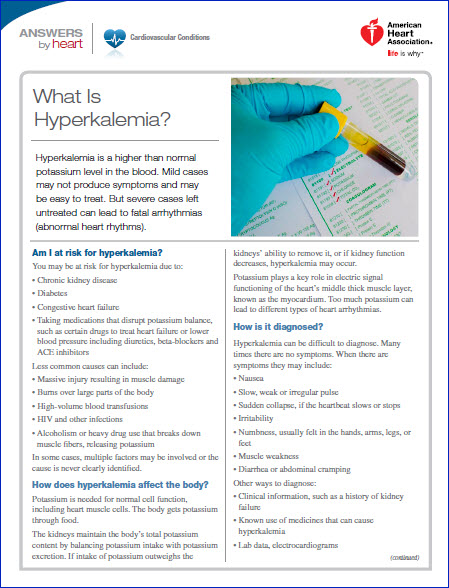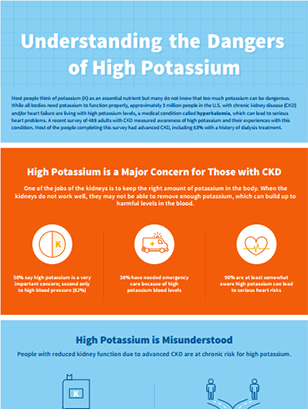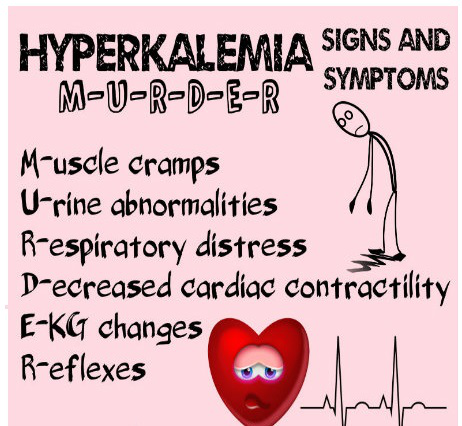When you have too much potassium in your blood it is called high potassium or hyperkalemia. Common causes of hyperkalemia include kidney failure hypoaldosteronism and rhabdomyolysis.
 Low Potassium Symptoms Foods To Help Overcome Dr Axe Low Potassium Symptoms Potassium Deficiency Symptoms Potassium Deficiency
Low Potassium Symptoms Foods To Help Overcome Dr Axe Low Potassium Symptoms Potassium Deficiency Symptoms Potassium Deficiency
An arrhythmia can result in your heart beating too.

Causes of high potassium levels in blood. High potassium can even cause a heart attack or death. Unfortunately many people do not feel symptoms of high potassium. In addition to conditions like kidney disease these factors also contribute to hyperkalemia.
This means that potassium can build up in your blood to harmful levels. Or it can mean failure of the adrenal gland. The acidosis and high glucose levels in the blood work together to cause fluid and potassium to move out of the cells into the blood circulation.
Medications that contain potassium such as certain high blood pressure medicines. High blood potassium occurs when kidneys fail. Foods such as melons orange juice and bananas are high in potassium.
Consuming too much potassium through medications or diet can cause hyperkalemia. Potassium is often measured along with sodium levels to observe your blood pressure. As a result potassium builds up in your blood.
Other causes include alcoholism adrenal failure excessive use of potassium supplements and a severe injury which can destroy the red blood cells according to Mayo Clinic. Angiotensin-converting enzyme ACE inhibitors. The kidneys cannot get rid of the potassium as they normally would.
Kidney disease or kidney dysfunction is one of the main causes of high potassium in blood. This is rare but may affect people who have kidney disease. Higher potassium intake.
Addisons disease adrenal insufficiency Angiotensin II receptor blockers. Kidney failure is the most common cause of high potassium. When blood potassium levels exceed the normal range of 36 to 52 millimoles per liter a condition called hyperkalemia develops.
Problem in elimination of potassium through urine gives rise to high blood potassium levels. This can lead to. A high-potassium diet which can result from potassium supplements and salt substitutes.
Other causes of hyperkalemia include. Having too much potassium in your blood can be dangerous. A high potassium level can lead to widespread muscle fatigue and weakness.
The severity is divided into mild moderate and severe. When your kidneys fail or dont function properly they cant remove extra potassium from your body. Sometimes an injury can damage cells and release their potassium that way.
Few components of the blood are as vulnerable to blood collection handling and processing preexamination errors as potassium. Patients with diabetes often also have diminished kidney capacity to excrete potassium into urine. The leading causes of hyperkalemia are chronic kidney disease uncontrolled diabetes dehydration having had severe bleeding consuming excessive dietary potassium and some medications.
Pseudohyperkalemia due to breakdown of cells during or after taking the blood. If left untreated it can cause muscle paralysis and. Too much potassium in your blood can lead to heart conditions such as an arrhythmia.
While low levels can affect your health high potassium levels are also detrimental. In fact Youngs Effects of Preanalytical Variables on Clinical Laboratory Tests lists over 50 preventable preanalytical conditions that cause a potassium level to be falsely elevated. Eating too much food that is high in potassium can also cause hyperkalemia especially in people with advanced kidney disease.
Lower potassium levels can mean higher sodium levels resulting in a risk of high blood pressure. The most common cause of genuinely high potassium hyperkalemia is related to your kidneys such as. Eat a diet high in potassium.
A number of medications can also cause high blood potassium including spironolactone NSAIDs and angiotensin converting enzyme inhibitors. Chronic renal failure lupus nephritis transplant rejections or any change in the dialysis treatment for kidney patients can lead to hyperkalemia. Click to see full answer.
A doctor will typically diagnose hyperkalemia when levels of potassium are between 5055 milliequivalents per liter mEql. This condition is also known as an irregular heartbeat. High levels can be detected on an electrocardiogram.
Kidney disease is the primary cause of elevated potassium levels making the kidneys unable to filter extra potassium from the blood notes WebMD. When you have kidney disease your kidneys cannot remove extra potassium in the right way and too much potassium can stay in your blood.
 Hyperkalemia High Potassium American Heart Association
Hyperkalemia High Potassium American Heart Association
 Evidence Based Perioperative Management Of Patients With High Serum Potassium Level In Resource Limited Areas A Systematic Review Sciencedirect
Evidence Based Perioperative Management Of Patients With High Serum Potassium Level In Resource Limited Areas A Systematic Review Sciencedirect
 Six Steps To Controlling High Potassium National Kidney Foundation
Six Steps To Controlling High Potassium National Kidney Foundation
/hyperkalemia-causes-23-5af1a766ff1b7800368607af.png) Hyperkalemia Causes And Risk Factors
Hyperkalemia Causes And Risk Factors
 What Causes High Potassium Levels In The Elderly
What Causes High Potassium Levels In The Elderly
 High Potassium Hyperkalemia National Kidney Foundation
High Potassium Hyperkalemia National Kidney Foundation
 Hyperkalaemia High Potassium Level In The Blood Health Life Media
Hyperkalaemia High Potassium Level In The Blood Health Life Media
 Why Extremely High Levels Of Potassium In Blood Can Kill Your Patient Steemit
Why Extremely High Levels Of Potassium In Blood Can Kill Your Patient Steemit
 10 Effects Of Hyperkalemia On The Body
10 Effects Of Hyperkalemia On The Body
/hyperkalemia-symptoms-5ad4e0b0642dca00363403f9-632e11ad1a4149e181fe7be2519de615.png) Hyperkalemia Overview And More
Hyperkalemia Overview And More
 Potassium Disorders Hypokalemia And Hyperkalemia American Family Physician
Potassium Disorders Hypokalemia And Hyperkalemia American Family Physician
 Causes Of Hyperkalemia Download Table
Causes Of Hyperkalemia Download Table
High Potassium Hyperkalemia Causes Prevention Treatment American Kidney Fund Akf
 Hyperkalemia Treatment Diet Prevention Of High Potassium
Hyperkalemia Treatment Diet Prevention Of High Potassium

No comments:
Post a Comment
Note: Only a member of this blog may post a comment.